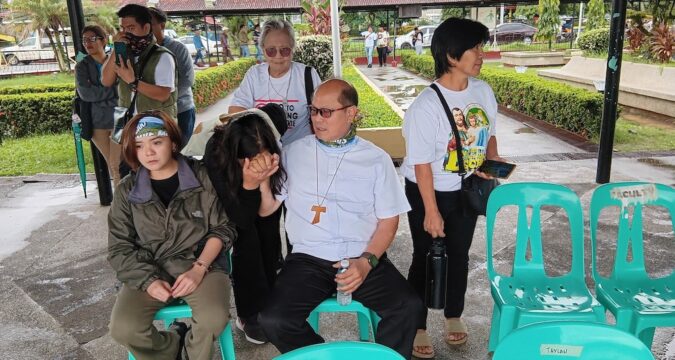
BAYOMBONG (LiCAS News): Bishop Elmer Mangalinao of Bayombong, Nueva Vizcaya, the Philippines, urged the province’s elected officials to speak out against police violence toward residents defending the environment in Bitnong village, Dupax del Sur.
“We need your voice now against the violence committed by the police against those defending the environment in Barangay Bitnong, Dupax del Sur,” he said.
Bishop Mangalinao said the people need public officials who will stand for justice, for creation, and for the people.
The bishop’s call comes as residents from five villages—Bitnong, Inaban, Munguia, Parai, and Oyao—continue to oppose the mining exploration by the Woggle Corporation.
The affected communities are within the 3,102-hectare area covered by Exploration Permit No. 00030-II, issued by the Mines and Geosciences Bureau on 4 August 2025.
We are doing our best to stop the exploration because it will cause destruction to life, land, culture, and tradition of the villages
Bishop Mangalinao
Locals have been staging protests, citing a lack of proper consultation, threats to their farms and water sources, and potential damage to their ancestral lands.
“We are doing our best to stop the exploration because it will cause destruction to life, land, culture, and tradition of the villages,” Bishop Mangalinao said.
He lamented that Philippine laws appear to favour mining corporations, noting that the company has long operated in their area and is now targeting another site within the Cagayan Valley watershed.
The Order of Friars Minor in the Philippines [Franciscans] released a statement expressing “fraternal solidarity” with the residents of Dupax del Norte who are defending their land and cultural heritage from “the harmful exploration activities of Woggle Corporation.”
As we celebrate the 500 years of Christianity in the Philippines. The Chaplaincy to Filipino Migrants organises an on-line talk every Tuesday at 9.00pm. You can join us at:
https://www.Facebook.com/CFM-Gifted-to-give-101039001847033
The Franciscans said, “Our presence in this local Church is not administrative, but pastoral and incarnational—we breathe the same air, walk the same soil, and share in the hopes and wounds of the people entrusted to our care. Because we live among them, we cannot be indifferent.”
He lamented that Philippine laws appear to favour mining corporations, noting that the company has long operated in their area and is now targeting another site within the Cagayan Valley watershed
They affirmed the pastoral guidance of Bishop Mangalinao, saying his call “reminds us that the land is not merely territory but identity, memory, and covenant.”
The statement added, “To harm this land is to harm the families we serve, the young people we accompany, and the communities whose journey we share.”
They said projects that “disregard human dignity and communal discernment are not only environmentally destructive” but “they are morally and spiritually unjust.”
The friars said their mission in the diocese for calls them to go beyond prayer by accompanying the people in their struggles—listening, journeying with them, and standing in their defense when needed.
They stressed that they are not distant observers but members of the same community, sharing in its burdens and hopes. For them, the fight to protect the land is not separate from their ministry but a living expression of the gospel.
Nueva Vizcaya, known for its rich farmlands and mountain watersheds, has long been a flashpoint in the Philippines’ struggle between mining interests and environmental protection.
For decades, indigenous and farming communities have fought to preserve their ancestral domains from extractive operations that threaten their way of life.








